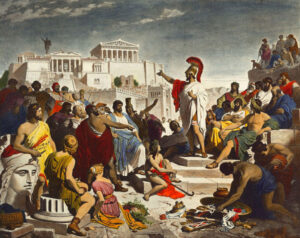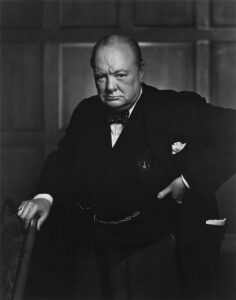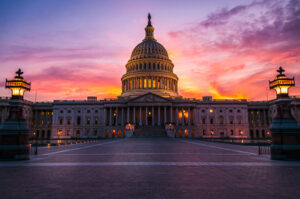
Is political science liberal arts? Political science is a liberal arts discipline that draws on many of the core elements of a humanities education in dialogue, psychology, analysis, and rhetoric. It is an important tool for understanding societies and cultures through history and into current times, making it a valuable part of the liberal arts tool chest.
 When you’re trying to decide whether or not a field of study is a part of the liberal arts, it’s often useful to go back to the roots of the field. Ancient Greek philosophers started laying the foundations of what we recognize as a liberal arts education way back in 300 BCE. And it’s not coincidental that their philosophical explorations often focused on the rule of the places they lived, a polis, or city.
When you’re trying to decide whether or not a field of study is a part of the liberal arts, it’s often useful to go back to the roots of the field. Ancient Greek philosophers started laying the foundations of what we recognize as a liberal arts education way back in 300 BCE. And it’s not coincidental that their philosophical explorations often focused on the rule of the places they lived, a polis, or city.
As early Greek democracy flourished, the meaning of the term polis shifted a bit. Instead of just referring to the city as an entity in itself, it also came to refer to the body of citizens under the city’s jurisdiction, and who were collectively responsible for its rule. As a result, polis became a root word in policy, police, and, naturally, politics… the process by which those collective bodies debated concerns and came to decisions.
That makes political science one of the oldest liberal arts, and also one of the most relevant in practical terms. Politics will be how most of the biggest issues facing your country and your planet are dealt with; it will also affect everything from your rights as a citizen to your responsibilities as an individual. Almost no topic that touches on your life is immune to political processes. That makes politics a classic field of study for liberal arts students.
What Is The Role of Political Science in Liberal Arts Historically?
Politics has been a central part of the study of liberal arts at least since the time of Aristotle, who devoted an entire book to the subject and is often considered the father of modern political science.
Politics is a noble activity in which men decide the rules they will live by and the goals they will collectively pursue.
~ Aristotle
Aristotle, like many subsequent political scientists, understood politics to be the inevitable emergence of systems for allocating power and preference in human society. In other formulations, politics has been likened to what happens when a family of four tries to decide where to go out for dinner. It’s a process that is built into the human experience at every level of social interaction.
That makes political science, the study of those processes, a key piece of a liberal arts education.
 Many of the great political figures of Western history had what would today be considered a classical liberal arts education. It’s no great accident that Winston Churchill, for example, was a prolific writer and orator as well as a masterful politician—his training in the classics prepared him with exposure to the history of Rome and the works of Shakespeare.
Many of the great political figures of Western history had what would today be considered a classical liberal arts education. It’s no great accident that Winston Churchill, for example, was a prolific writer and orator as well as a masterful politician—his training in the classics prepared him with exposure to the history of Rome and the works of Shakespeare.
A broad understanding of the humanities is pretty useful stuff when you seek to govern people. And the many different types of issues touched on in politics argues for a strong interdisciplinary education to help understand all the complex factors and considerations that enter into modern political decision-making.
Political Science is Among The Most Useful of Modern Liberal Arts Fields
Politics is timeless, which makes it a subject of continuing interest and importance in liberal arts programs. Liberal studies programs with a concentration in political science are common today, including those with online course options.
 It’s not just historical figures in politics that have benefited from a liberal arts education; Rahm Emanuel graduated from Sarah Lawrence with a degree in liberal studies and went on to become U.S. Ambassador to Japan, mayor of Chicago, and chief of staff to President Barack Obama. Rahmbo, as he was widely known for his tough negotiating style, also danced ballet in college and was managing director for an investment banking firm for a time, illustrating the breadth of skills that come with a liberal arts degree.
It’s not just historical figures in politics that have benefited from a liberal arts education; Rahm Emanuel graduated from Sarah Lawrence with a degree in liberal studies and went on to become U.S. Ambassador to Japan, mayor of Chicago, and chief of staff to President Barack Obama. Rahmbo, as he was widely known for his tough negotiating style, also danced ballet in college and was managing director for an investment banking firm for a time, illustrating the breadth of skills that come with a liberal arts degree.
While political science studies continue to incorporate many of the traditional elements of liberal studies degrees, like literature, writing, and history courses, they also build on a rich mountain of modern adaptations in politics. You are just as likely to have coursework in data mining, project management, and conflict resolution techniques as on Aristotle’s four conceptions of politics.
Modern liberal studies in political science also benefit from the long span of historical data accumulated on political systems. The Greeks were working with Democracy fresh out of the oven, a new conception of rule with only their thought experiments to support it. Modern political scientists have a global history chock full of examples of polis ruled by emperors and kings, by commercial leagues and religious fiat. New data about how politics works comes in all the time, making political science one of the liberal arts where new innovations continue to emerge.
The liberal arts continue to have a strong role to play in those developments. Ranked voting, public polling, cryptographically secure voting systems, and other new ideas need the broad perspectives on history, the nature of humanity, the requirements of ethics, and the impact of interdisciplinary understanding to vet and improve them. Political science will be an important part of liberal arts for as long as people live and work together.





